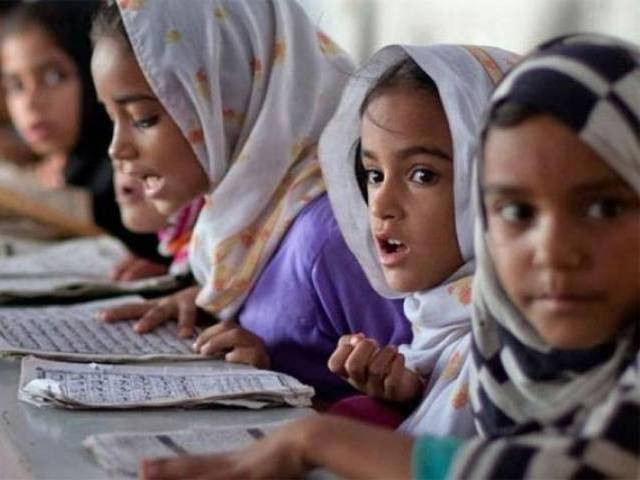Why educating our girls remains a challenge?
Pakistan has the second highest number of children out of school

PHOTO: Reuters
The problem of girls being left behind is often portrayed as a cultural problem, where parents of poor households are blamed for not sending their girls to school. However, recent research indicated that many of the barriers to girls’ education have to do with our public schooling system instead. Despite a growing demand for girls’ education, the Pakistan government simply has not established an education system adequate to meet the needs of the country’s children, especially girls.
Pakistan spends far less on education than needed. As a result, there is a dearth of government schools around the country, especially in rural areas. Families that can reach a government school often find it to be overcrowded, lacking in basic facilities like toilets or drinking water, and not having a sufficient number of committed teachers. Given this dismal situation, many illiterate and poor parents, who cannot afford pricier options, decide that there is no point in sending their children to school. Many of the above factors negatively impact education of boys as well. Yet, research indicates that there are fewer schools for girls than for boys. A so-called ‘upward bottleneck’ exists as children, especially girls, get older. Secondary schools for girls are in shorter supply than primary schools, and girls’ colleges are even scarce. Many girls are thus pushed out of continuing studies after the primary level.
Girls across our country do, of course, face barriers within their homes and communities which make it more difficult for them to get an adequate education. Many people still do not believe that girls need to be educated or they believe that girls should stop study beyond a certain age, typically puberty. However, even here the reasons are not entirely cultural. Survey work indicates that many families fear that their older girls will face sexual harassment at school and on the way there and back.
Gender-biased economic incentives also make it difficult to educate girls. While daughters are expected to go to live with their husband’s family and sons are expected to remain with their parents, sending sons to school is seen as a better investment in the family’s economic future. Many young girls are also put to work in home-based industries, such as sewing or embroidery. Many more girls than boys stay home to do housework in the family home or are employed as domestic workers.
Underage marriage has rightly been described as both a consequence of and a cause for girls not attending school. It is time for the government to declare 18 years as the national minimum age of marriage, which will help encourage more families to allow their girls to study, and even help avert a range of health issues.
Human Rights Watch has put forth several other recommendations as well. Foremost amongst them is the need for all provincial governments to make girls’ education a priority within their education budget and to construct and rehabilitate girls’ schools and provide them with adequate facilities. Girls’ schools also need better-trained and committed female teachers, and free-of-cost school supplies, and an atmosphere which is free from harassment or physical violence. Until sufficient government schools are available for girls, it is suggested that scholarships be provided to girls who can access nearby private schools. Ultimately, however, it is the government’s not the private sector’s responsibility to ensure that Pakistani girls are able to get an adequate education.
Unless the government realises that it needs to do more to create a much more enabling environment for educating girls, poor families will continue feeling reluctant to send their girls to school, and Pakistan will remain unable to achieve the goal of universal education, and several other related human development goals.
Published in The Express Tribune, December 21st, 2018.
Like Opinion & Editorial on Facebook, follow @ETOpEd on Twitter to receive all updates on all our daily pieces.















COMMENTS
Comments are moderated and generally will be posted if they are on-topic and not abusive.
For more information, please see our Comments FAQ